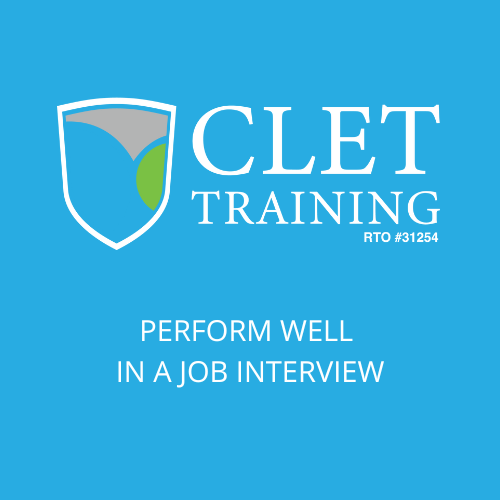How to Perform well in a job interview
From the desk of CLET's Managing Director Allen Williams
Performing well in a job interview requires preparation, confidence, and a positive attitude.
Here are some tips to help you succeed:
Research the company or organisation/department: Before the interview, learn as much as you can about the company/organisation/department, its products or services, mission and values, and the department you would be working in. This information will help you tailor your responses to the specific needs of the company.
- Prepare responses to common interview questions: Common interview questions include "Tell me about yourself," "Why do you want to work for this company?" and "What are your strengths and weaknesses?, plus any questions you can predict that may be asked from the selection criteria" Practice your responses to these questions so that you can answer them smoothly and confidently.
- Dress appropriately: Make sure to dress professionally and in a manner that is consistent with the company's culture and dress code.
- Take a portfolio with your up-to-date resume, any qualifications, courses, work references and other documents that support your achievements relevant to the position you are attending the interview for.
- Arrive on time: Plan to arrive 10-15 minutes before the scheduled interview time. This will give you time to compose yourself and be ready to make a good impression.
- Be positive and confident: During the interview, maintain good eye contact, sit up straight, and speak clearly. Show enthusiasm for the job and the company, and be confident in your responses.
- Ask questions: At the end of the interview, be sure to ask questions about the company, the role, and what the next steps are in the hiring process. This shows that you are engaged and interested in the position.
- Follow up: After the interview, send a thank-you note to the interviewer to express your gratitude for the opportunity and to reiterate your interest in the position.
Remember that an interview is a two-way conversation, and the interviewer wants to get to know you as well as you want to get to know the company. Stay positive and be yourself, and you will increase your chances of a successful outcome.
What do I wear to a job interview?
The appropriate attire for a job interview depends on the company culture and the position you are applying for. Generally, it is best to err on the side of dressing more formally for an interview. Here are some general guidelines to consider:
For men:
- Wear a suit in a neutral colour such as navy, black, or grey.
- Wear a dress shirt in a light colour such as white or light blue.
- Wear a conservative tie.
- Polish your dress shoes.
For women:
- Wear a suit or dress in a neutral colour such as navy, black, or grey.
- Wear a blouse in a light colour such as white or light blue.
- Consider wearing closed-toe shoes with a low heel.
In both cases:
- Ensure that your clothes are clean, pressed, and wrinkle-free.
- Avoid wearing too much jewellery, heavy fragrances, or distracting accessories.
- Make sure your hair is neat and clean.
Remember, the goal of your attire is to present yourself professionally and to make a positive first impression. It's always better to be overdressed than underdressed for a job interview.
Posted by CLET on 10/02/2023

